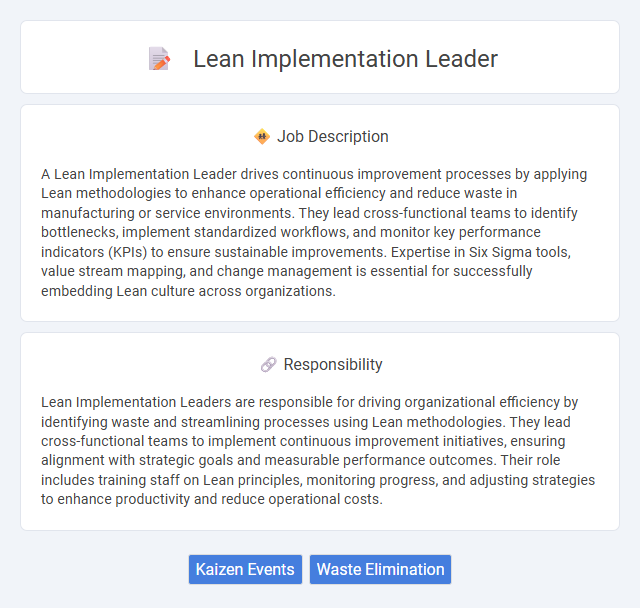
A Lean Implementation Leader drives continuous improvement processes by applying Lean methodologies to enhance operational efficiency and reduce waste in manufacturing or service environments. They lead cross-functional teams to identify bottlenecks, implement standardized workflows, and monitor key performance indicators (KPIs) to ensure sustainable improvements. Expertise in Six Sigma tools, value stream mapping, and change management is essential for successfully embedding Lean culture across organizations.
Individuals who demonstrate strong problem-solving skills and a collaborative mindset will likely be suited for a Lean Implementation Leader role, as it requires guiding teams through process improvements. Those comfortable working in dynamic environments and managing change effectively may find this position aligns well with their capabilities. Conversely, people resistant to change or lacking interpersonal skills might experience challenges adapting to the demands of this role.
Qualification
A Lean Implementation Leader requires extensive expertise in Lean Six Sigma methodologies and a proven track record of leading process improvement initiatives across manufacturing or service environments. Strong analytical skills, project management certification, and experience with change management strategies are essential to drive efficiency and eliminate waste. Proficiency in data analysis tools, stakeholder communication, and team leadership fosters successful Lean transformations aligned with organizational goals.
Responsibility
Lean Implementation Leaders are responsible for driving organizational efficiency by identifying waste and streamlining processes using Lean methodologies. They lead cross-functional teams to implement continuous improvement initiatives, ensuring alignment with strategic goals and measurable performance outcomes. Their role includes training staff on Lean principles, monitoring progress, and adjusting strategies to enhance productivity and reduce operational costs.
Benefit
Lean Implementation Leader roles likely drive significant efficiency improvements by identifying and eliminating waste in processes, leading to cost reductions and enhanced productivity. Their leadership in fostering a culture of continuous improvement probably results in higher employee engagement and better quality outcomes. Companies may experience faster project completion and increased customer satisfaction due to streamlined operations under their guidance.
Challenge
The Lean Implementation Leader is likely to face the challenge of driving cultural change within organizations resistant to new methodologies. Navigating complex team dynamics and overcoming skepticism about Lean principles may require persistent communication and strategic influence. Success depends on the ability to foster collaboration and demonstrate measurable process improvements despite initial pushback.
Career Advancement
A Lean Implementation Leader drives operational excellence by spearheading continuous improvement initiatives, utilizing Lean Six Sigma methodologies to optimize processes and reduce waste. Mastery in project management, change management, and cross-functional collaboration enhances leadership skills, positioning professionals for rapid career growth into senior operational roles. Proven success in delivering measurable efficiency gains and cost savings significantly boosts advancement opportunities within manufacturing, healthcare, and service industries.
Key Terms
Kaizen Events
A Lean Implementation Leader spearheads Kaizen Events to drive continuous improvement and operational excellence within organizations. They facilitate cross-functional teams in identifying waste, streamlining processes, and enhancing productivity while fostering a culture of collaboration and accountability. Expertise in Lean Six Sigma methodologies and strong change management skills are critical for successfully executing Kaizen initiatives and achieving measurable business results.
Waste Elimination
Lean Implementation Leaders drive waste elimination by applying Lean principles and tools such as Value Stream Mapping, 5S, and Kaizen events to identify and eliminate non-value-added activities. They lead cross-functional teams to streamline processes, reduce cycle times, and enhance operational efficiency, resulting in cost savings and improved productivity. Expertise in continuous improvement methodologies enables Lean Implementation Leaders to sustain waste reduction initiatives and foster a culture of operational excellence.
 kuljobs.com
kuljobs.com